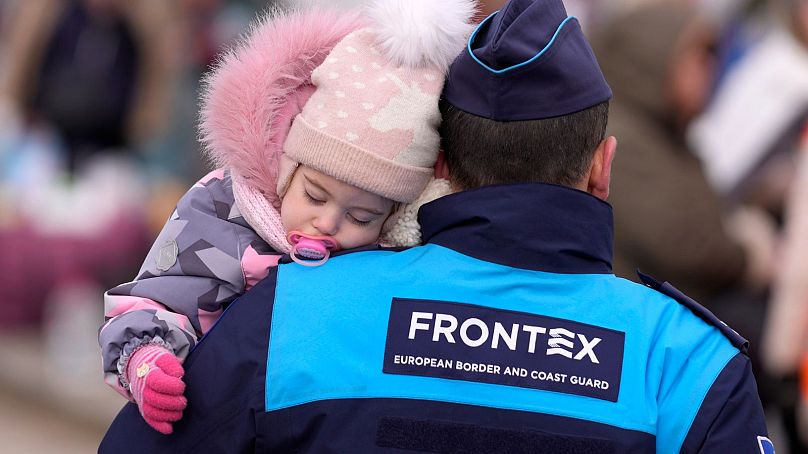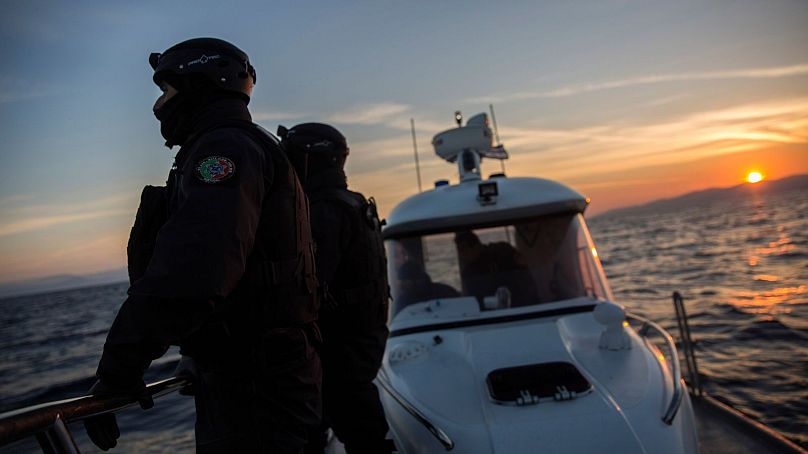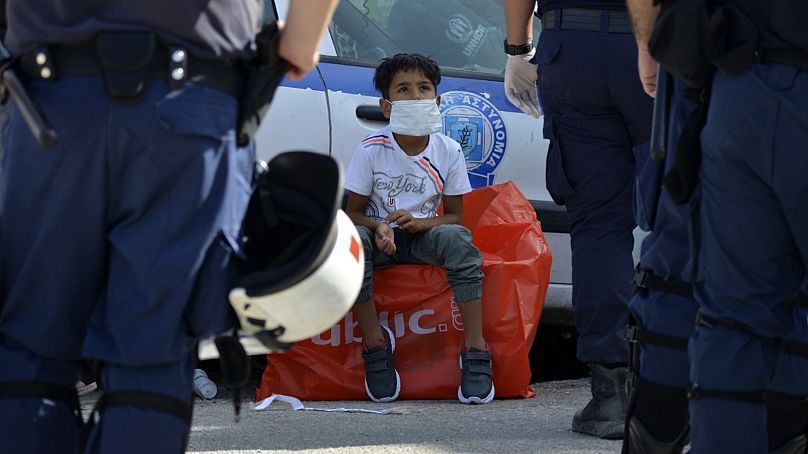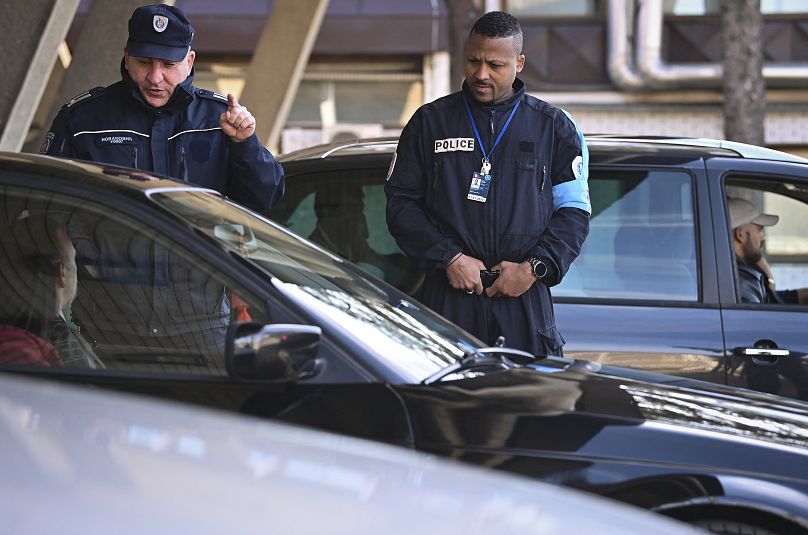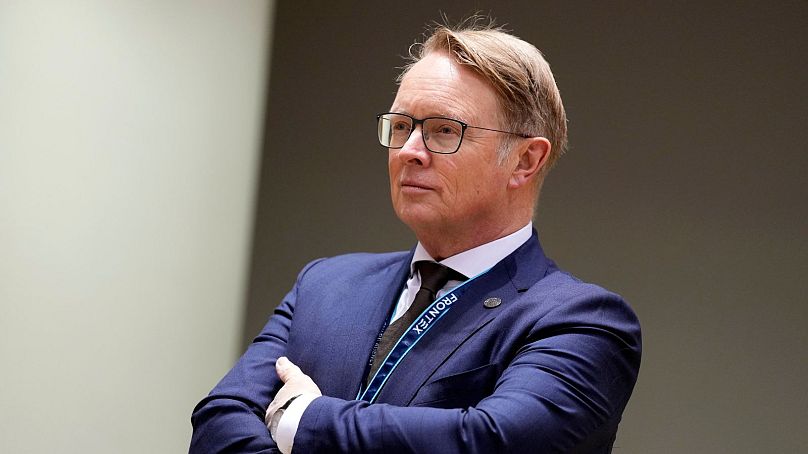Evidence has amassed in recent years that Frontex has violated human rights at Europe’s borders – but the border agency is surprisingly hard to hold to account.
The UK government’s recent plan to bar asylum seekers who enter the country illegally, such as by crossing the Channel, sparked an international backlash.
 ADVERTISEMENT
ADVERTISEMENT
 ADVERTISEMENT
ADVERTISEMENT
Among the most outraged were the European Union’s top officials, with European Home Affairs Commissioner Ylva Johansson warning Britain its new policy violates international law.
But as the EU points the finger at the UK’s anti-migrant policies, others are pointing the finger back at Europe - especially its powerful and controversial border agency, Frontex.
Created in 2004, a good decade before the so-called 2015 European migrant crisis, the Warsaw-based border agency was tasked with the role of protecting the EU borders, plus fighting human trafficking, smuggling and other cross-border crimes.
Among these, of course, was illegal migration.
But increasingly, Frontex’s role at the borders of Europe has become murkier and more hotly contested.
With thousands of people escaping poverty, hunger, war, domestic abuse, and persecution piling up at the doors of what has been dubbed 'Fortress Europe', Frontex stands accused of violating human rights, intimidating migrants and abusing power.
Last spring, in the wake of an EU investigation that alleged Frontex staff had covered-up human rights violations in EU member states, director Fabrice Leggeri and two other high-ranking officials resigned.
However, Frontex still shuns responsibility. No fundamental action has been taken to reform the agency, one of the best-funded within the entire bloc with a budget of €754 million, as per 2022 data.
What is Frontex accused of?
Omer Shatz - lawyer, human rights activist and legal affairs director of NGO front-Lex - could detail a long list of how Frontex has violated European law, human rights, maritime law and its own guidelines in recent years.
Yet, to simplify things, he breaks the list into just three examples.
One: Frontex has provided the location of migrants and refugees who were intercepted at sea and forcibly transferred to migrant camps in Libya, where “crimes against humanity are taking place”, according to Shatz.
“We are looking at about more than 150,000 civilians since 2016 -- including thousands of children -- that were abducted and possibly transferred to Libyan camps where they were systematically raped, tortured and enslaved,” he told Euronews.
“And this is Frontex that is orchestrating these policies, in the sense that without Frontex providing the coordinates and the geo-localisation of the migrant boats in the Central Mediterranean in international waters, the militias that Frontex is collaborating with would not have found them, ever.”
In December, Human Rights Watch and Border Forensics published evidence of Frontex’s involvement in the interception and transfer of thousands of migrants to Libya. They accused it of alerting the Libyan coast guard, instead of search and rescue units.
According to Frontex, "the accusations related to rescues off the Libyan coast show a complete lack of understanding of international law.
"Frontex planes frequently encounter overcrowded boats in peril within the internationally recognised Libyan Search and Rescue (SAR) Region," the agency told Euronews. "In accordance with international law, search and rescue operations are always coordinated by the national rescue centres. While the agency does not cooperate with Libyan authorities in any capacity, it is obliged by the law to inform the country’s rescue coordination centre (RCC) of any boat in distress within their SAR zone.
"Every time a Frontex plane comes across a boat in distress, it immediately alerts all the neighbouring RCCs: Italy, Malta and Tunisia to potentially speed up the rescue operation and improve the coordination. Other actors in the area, including commercial ships and NGOs, follow the same protocol.
"Based on information provided by Frontex, the relevant rescue centre – usually the nearest one – initiates a rescue operation. Frontex shares the boat’s location, its condition, estimated number of persons aboard, any navigation and communication equipment, along with the weather and sea conditions in the area."
The agency added that "thanks to our aerial surveillance in the Central Mediterranean, Frontex was able to contribute to the rescue of more than 24 000 people last year alone."
Two: Frontex is supposedly responsible for what Shatz calls “killing by omission” policies in the Mediterranean.
“Frontex... intentionally withdrew its assets from critical areas where asylum seekers are likely to be in distress,” Shatz said. “Removing the assets, changing the mandate of these Frontex operations was made intentionally to increase death rates [in the Central Mediterranean], thinking that this would deter migrants from making the trip.”
Almost 25,000 people have died in the Mediterranean since 2014, according to Human Rights Watch.
“We are talking about mass drowning, mass killing of people,” Shatz said. "This is unprecedented. It's not the enemy, it's just civilians.”
Shatz brought a case to the International Criminal Court (ICC) in 2019 bringing evidence that Frontex knew that its joint operation Triton would increase death rates in the Central Mediterranean, but didn’t change the policy – which is still in force.
According to him, Frontex used the drownings “to justify the policy of capture and forced transfer to the camps.”
“First they created the conditions in which people would drown to death, then they said ‘Okay, before drowning and being transferred to a camp [...] the latter is the lesser evil’,” Shatz said.
Frontex launched Operation Triton in 2014 to replace the Italian Mare Nostrum, a search and rescue operation started after 366 people died in a shipwreck off the coast of Lampedusa. But unlike Mare Nostrum, Triton shifted the focus from search and rescue to border control, increasing surveillance.
In the years following the launch of Triton, the death rate in the Mediterranean increased by 30%.
Frontex knew this would happen, Shatz’s lawsuit at The Hague alleged.
The EU policy constituted the “most lethal and organised attack against civilian population the ICC had jurisdiction over in its entire history,” the lawsuit read.
The European Commission dismissed the accusation and said the bloc's priority has always been to protect lives. Josep Borrell, then Spanish foreign minister claimed Libya’s migrant camps couldn’t “be referred to as torture detention centres”.
The third, and final, example of human rights violations Frontex is accused of is evidence that migrants and asylum seekers were removed from safety and put back in the middle of the sea after reaching European soil.
“This is plain murder,” Shatz said. “We’re looking at 70,000 people who made land on Greek soil or were captured on Greek waters -- there’s no difference in legal terms -- then they knocked at the door of asylum centres to apply for asylum and were treated like criminals."
"They were put into vans, put back ashore, put back on boats and then abandoned at sea with no means of navigation, no means of communication, no food," he added.
“This is the everyday job of a Frontex agent in Greece. This is the division of labour between Greece and Frontex. Frontex is in charge of the internal surveillance, interception, nailing down and stopping the boat. Then they call the Greeks to do the ‘dirty job’ of moving migrants to rafts and abandoning them at sea.”
In July 2021, the European Parliament’s Frontex Scrutiny Working Group produced a report which affirmed that there was no evidence of the agency's involvement in any violation of human rights.
"The group made recommendations to avoid any risk of similar allegation in the future and the agency has completed most of them. Frontex has upgraded its reporting mechanism and reinforced its operational coordination centres to improve information exchange," Frontex said in a statement to Euronews.
"The agency is in a dialogue with the Greek authorities to improve fundamental rights safeguards."
Why is Frontex so hard to be brought to justice?
When Shatz’s NGO front-Lex started operating, there was not a single case against Frontex for alleged human rights violations -- despite the issue being brought up by investigative journalists and migrant advocates.
He and his partners were the first to file a lawsuit against Frontex in 2019, though the case is pending and it could be years before a judgement.
“The damage is already done, it has already happened. We’re dealing with ongoing policies, arguably ongoing atrocities and crimes, which are quite urgent to adjudicate,” he said.
The Israeli lawyer alleged Frontex is hard to be prosecuted “by design”. Behind the agency, there are the EU member states. Frontex is “just a skeleton,” Shatz said, made up of individual countries’ border forces.
“If you want to challenge the policies of Frontex in Greece, where do you go?,” he asked. “I have an applicant who was thrown into the water and watched others drown to death. He was rescued by Turkish authorities and he’s now in detention. Where should he go?” Frontex would bounce responsibility to Greece because the country is in charge of the joint operation. But bringing individual states to court is long and counterproductive, Shatz said.
"To date, Frontex enjoys full impunity, they’re completely unaccountable,” the lawyer said. According to the current regulation, “the responsibility for the control and surveillance of the external borders lies with the Member States” -- Frontex is only responsible for the “coordination” of national forces.
Currently, there’s an ongoing damage lawsuit against the border agency, brought by a Syrian family with four young children who requested asylum in Greece in 2016.
A few days after applying for asylum, they were put on a plane and told they would be brought to Athens. During the flight, the family was separated from one another. When they got off the plane, they realised they had been brought to Turkey.
“Their return to Turkey was unlawful because their request to be granted asylum had not been processed, nor had a decision been taken that they could be returned to Turkey, as required by EU law,” Lisa-Marie Komp, one of the lawyers representing the Syrian family, told Euronews.
“The fundamental rights of the Syrian family had been violated. The flight was operated by the EU Agency Frontex together with Greece. Frontex's mandate requires it to ensure compliance with fundamental rights in all its activities. In this case, Frontex had failed to do so.”
The case is significant because, until now, Frontex has always pointed to the EU member states in regard to alleged human rights violations.
“However, Frontex is required to ensure compliance with fundamental rights in all its activities,” Komp said. “This means that Frontex itself should bear liability if it fails to fulfil its monitoring tasks and fundamental rights are violated. Given that there have been numerous reports about Frontex's involvement in pushbacks in recent years, the outcome of the case will have an important impact.”
The case was put in front of the Court of Justice of the European Union on 9 March.
Frontex lawyers said the case should have been brought against Greek authorities rather than the border agency. “Shared duty of responsibility” in the context of the handling of asylum seekers between Frontex and Greece does not mean that there is also a “shared liability”, the Frontex representatives said.
Should Frontex be abolished – or can it be turned into a force for good?
While activist groups call for Frontex to be disbanded -- such as the aptly named Abolish Frontex -- neither Komp nor Shatz thinks Frontex should be gotten rid of.
Instead, they want the border agency to follow its own mandate and respect human rights, maritime and international law, plus be held accountable for its alleged violations.
There are signs that Frontex has been trying to reform itself over the past two years.
New director Hans Leijtens has committed to ending the agency’s involvement in illegal pushbacks, while promising greater transparency.
A fundamental rights officer, Jonas Grimheden, is now in place to make sure the agency follows its Fundamental Rights Action Plan, adopted in 2021. In a statement to Euronews, Grimheden said that the agency has "undergone significant developments in terms of fundamental rights guarantees since the current EU regulation, on which its work is based."
In addition to the role he currently covers, Grimheden said, "a complaint mechanism and an internal Serious Incident Reporting Mechanism, the Agency is equipped with an independent Fundamental Rights Office.
"The Office, reporting directly to the Management Board, includes the Monitors and a total staff of over 60 persons, who spend extensive periods in the field, to advice and monitor. The monitors are present in the Frontex monitoring room, they have access to aerial surveillance, and advise on the best possible use of Agency assets from a fundamental rights perspective. The impact that we have on the activities of Frontex is not to be underestimated and without the Agency’s presence at land, air and sea borders, I am convinced that we would see many more fundamental rights violations."
But Shatz argues that it's still not enough.
"You can keep changing the names and the faces [at the top of Frontex's management], but the policies remain the same. Accountability is important, of course, and the fact that Leggeri stepped down doesn't mean he's not criminally or otherwise liable, we're still working on that," Shatz said. "But what about their policies? They will tell you excuses. This is high-level bullshit."
Giving hope for actual change is the role Frontex played in managing the Ukrainian refugee influx to the EU after the Russian invasion last year.
In an open-access book about the EU’s response to the large-scale displacement, Mariana Gkliati, Assistant Professor of International and EU law at Radboud University in the Netherlands, wrote: “The last months have shown the potential of Frontex to evolve into a reliable border management actor that operates with efficiency, transparency, and full respect for human rights.”
In order to respond to the emergency, the EU introduced the Temporary Protection Directive -- an exceptional measure to provide immediate help to those fleeing the war. These refugees enjoying temporary protection are entitled to a residence permit for the duration of the directive, are guaranteed access to the asylum procedure, suitable accommodation, employment, medical care, education, and more.
"In response to the Ukrainian displacement, Frontex has shown a diametrically opposite face to the human rights criticism of the last years," Gkliati told Euronews. "EU policy in the area has been revolving in the last decades around security and containment. As a result, migration management has become equivalent to border control and mobility deterrance. The practice regarding the Ukrainian displacement is challenging this perception. We saw that a border management agency can have a role even with an open borders policy."
No concerns have been expressed by observers so far regarding the direct or indirect involvement of the agency in any human rights violations with respect to persons (Ukrainians or not) fleeing the war in Ukraine, Gkliati said. "So, there is space in the agency’s mandate not only for regular border management, but also for addressing crisis situations at the borders in full respect of human rights, and for conducting voluntary returns in dignity and safety."
Still, people like Komp and Shatz aren't satisfied with the promise of change.
For the thousands dying at sea or ending up in third-party countries deemed unsafe, the lawyers want Frontex to be held accountable for its actions today.
The main issue with Frontex, the lawyer said, "it's not about migration. It's about the collapse of the rule of law in general. Migrants are just the first victims, but eventually, this will also reach EU citizens."
Gkliati said that reforming Frontex is a matter of "volatile political will and good intentions."
"It becomes apparent that the misorientation of the agency until now has not actually been the result of legal gaps or unclear obligations, as has been argued by the former Frontex Executive Director, but is rather a matter of political will and the direction given by the Commission and the Council," she said. "This shows that a change in the direction and the practices of the agency is indeed possible. The agency’s legal obligations are clear and the EBCG Regulation allows for a mandate to undertake such border management operations."
She added: "We cannot depend on volatile political will and good intentions. In order to ensure full compliance with the law, Frontex needs to be governed by strong accountability mechanisms. Above all, we need an effective system of external and independent monitoring."











